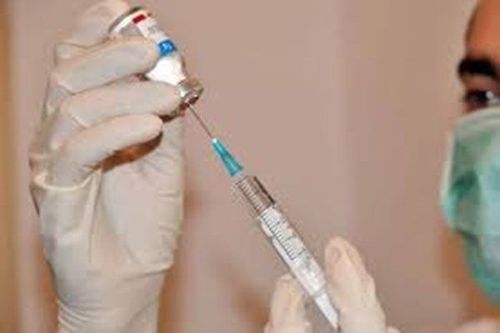This is an automatically translated article.
Ribasren's main ingredient is Ribavirin, which belongs to the group of antiviral drugs. Ribasren is indicated in the following cases: Patients with hepatitis A, B, C caused by viruses, herpes zoster, herpes simplex, viral diseases in children such as measles, mumps, chickenpox, respiratory syncytial.1. What is Ribasren?
Ribasren medicine has the main ingredient Ribavirin, which belongs to the group of antiviral drugs. Ribasren is a synthetic nucleotide with a guanosin-like structure that inhibits viral replication by inhibiting RNA and DNA synthesis, thereby inhibiting protein synthesis and viral replication. The antiviral effect of Ribasren is mainly located in susceptible virus-infected cells.
Ribasren is made in the form of capsules with each tablet containing 400mg of Ribavirin.
2. Indications of the drug Ribasren
Indications for use of Ribasren drug in the following cases:
Respiratory syncytial virus (RSV) infection of the lower respiratory tract (including bronchiolitis and pneumonia) in high-risk children (newborns) prematurity, congenital malformations in the heart, lungs, immunodeficiency, malnutrition,... hospitalization). Although it is possible to start Ribasren before the patient has a diagnosis, Ribasren should be continued only when the patient is certain to have RSV infection. Therefore, it is necessary to diagnose quickly and get early results of the disease. Viral hemorrhagic fevers include Lassa fever, hemorrhagic fever with pulmonary syndrome, renal syndrome (due to Hantavirus infection), Crimean - Congo hemorrhagic fever. Influenza A or B virus infection. Chronic hepatitis C virus infection in people with compensated liver disease who have not been treated with interferon or have relapsed after interferon alpha-2b therapy: In combination with Interferon alpha-2b or Peginterferon alpha-2b to treatment because Ribasren alone has no effect. This regimen is effective even in cases of hepatitis C with HIV co-infection.
3. Contraindications of Ribasren
The use of Ribasren is contraindicated in the following cases:
Patients with a history of allergy or hypersensitivity to Ribavirin or to any component of Ribasren. Patients with severe heart disease, uncontrolled or unstable heart disease within 6 months, patients with myocardial ischemia. Severe kidney disease, including those with chronic renal failure or with creatinine clearance (ClCr) < 50 ml/min or patients on dialysis. Thalassemia , thalassemia , sickle cell anemia . Concomitant administration of Ribasren and Peginterferon alfa or Interferon alpha is contraindicated in subjects with psychiatric disorders, autoimmune hepatitis, decompensated cirrhosis, cirrhosis with chronic HCV infection, decompensated cirrhosis with pre-existing HIV and during treatment, severe liver failure.
4. Dosage and usage of Ribasren
4.1. Dosage of Ribasren
Adults:
Chronic hepatitis B, C: The average oral dose is 400mg/time x 2 times/day. The dose can be adjusted according to weight, the dose can be increased to 1200mg/day for people weighing more than 85kg. Use combination drug Ribasren with Interferon (3 - 5 million international units/time, injected 3 times/week), or Peginterferon dose 1.5 microgram/kg/time (injection once/week). The duration of treatment depends on the genotype (genotype) of the hepatitis C virus and on whether the patient has been previously treated with Interferon. Hepatitis C virus infection (mono) genotypes 1, 4, treatment for 48 weeks, types 2 and 3 for 24 weeks, and types 5 and 6, there is no clinical experience. In case of HIV co-infection, treatment should be given within 48 weeks, regardless of genetic virus infection. Interferon-treated cases have relapsed: Continued combination therapy with Ribasren for 24 weeks, and at week 24, patients should be checked for response to treatment by measuring HCV RNA levels. serous. If there is no response to treatment, the drug should be discontinued because it is unlikely to be effective with further treatment. Dengue fever (including Lassa fever, viral fever): Oral use of Ribasren for prophylaxis when patients are at high risk of exposure: Take 500-600mg/time x 4 times/day, lasting for 7 days. - 10 days. Hepatitis A: Oral dose of 800mg/day, divided into several times a day, lasting for 10-14 days. Herpes zoster/simple: Oral dose of 800-1200mg/day, divided into 3-4 times a day, treatment lasts from 7-10 days. Prophylaxis of genital herpes recurrence: Oral dose of 400mg/day, divided into 1-2 times a day, treatment lasts for 6 months. Children: Treatment with Ribasren is not recommended for children and adolescents (< 18 years of age) due to insufficient data on safety and efficacy when combined with other medicinal products for the treatment of inflammation. hepatitis C.
Chronic hepatitis C: Use oral Ribasren in combination with interferon. Children over 3 years old: 15mg/kg body weight/day, divided into 2 times. Dengue fever (Lassa fever, viral fever): Oral use of Ribasren for prophylaxis when patients are at high risk of exposure: Children 6 - 9 years old: Take 400mg/time x 4 times/day, for a long period of time. 7 to 10 days long. Children under 6 years of age: The dose of Ribasren has not been determined. Other subjects
Renal impairment: The dose of Ribasren should be reduced for patients with creatinine clearance (CrCl) ≤ 50ml/min. ClCr 30 - 50ml/min: Alternate daily dose of 200mg and 400mg. ClCr < 30ml/min and/or on hemodialysis: 200mg/day oral dose. Elderly: Renal function must be assessed before using Ribasren.
4.2. How to take Ribasren?
Ribasren is in the form of capsules with each tablet containing 400mg of Ribavirin. Before taking Ribasren, patients need to carefully read the instructions for use on the drug leaflet. When taking Ribasren, the patient swallows the tablet whole, takes it with a full glass of water and should be taken at a fixed time of the day so that the patient does not forget the dose.
5. Undesirable effects of Ribasren
When using Ribasren, patients may experience some unwanted effects below:
Common unwanted effects:
Digestive system: Nausea, diarrhea, abdominal pain, loss of appetite, nausea , vomiting, dry mouth, bloating, constipation, bleeding gums, mouth ulcers, pancreatitis. Nervous system: flu-like symptoms, fever, fatigue, headache, tremor, myasthenia gravis, weight loss, dysesthesia, insomnia, anxiety, decreased concentration, emotional lability, hot flashes, increased sensation, dizziness, confusion. Blood and lymphatic system: Anemia, decreased hemoglobin, neutropenia, thrombocytopenia, swollen lymph nodes. Cardiovascular system: Tachycardia, increased or decreased blood pressure. Musculoskeletal system: Muscle pain, joint pain, rhabdomyolysis. On the skin: Hair loss, dry skin, rash, rash, itching, increased sweating. Respiratory system: Pharyngitis, rhinitis - sinusitis, cough, shortness of breath, chest pain. Five senses: Taste and vision disturbances, tinnitus, hearing loss. Endocrine - genitourinary system: Menstrual disorders, hypothyroidism or hyperthyroidism. Other: Increased risk of superinfection, other fungal and viral infections. Uncommon side effects: Depression.
Rare adverse effects:
Blood and lymphatic system: Hemolytic anemia. Respiratory system: Bronchospasm, especially in subjects with a history of asthma or obstructive pulmonary disease, severe progressive interstitial pneumonia.
6. Precautions when using Ribasren
Patients using Ribasren should note the following information:
Caution when using Ribasren for subjects under 18 years of age, especially when combining Ribasren with Interferon alpha - 2b because the effects and safety of this drug are unknown. Ribasren is at this age. Some psychotic symptoms have been observed in some patients when taking Ribasren in combination with Interferon alpha-2b with manifestations such as: insomnia, irritability, depression, suicidal ideation, excluding people with or without a history of mental disorders. Therefore, it is necessary to monitor and be careful when using oral Ribasren in combination with Interferon alpha-2b, especially in people with a history of or are suffering from depression, psychosis. Women of childbearing age: It is important to ensure that you do not become pregnant or intend to become pregnant during Ribasren treatment and for several months after treatment, because Ribasren is potentially teratogenic. Women of childbearing potential should use effective contraception during treatment with Ribasren and for 6 months after stopping it. If the patient becomes pregnant during this time, the doctor/pharmacist should inform the patient of the teratogenic potential of Ribasren. Patients must have blood tests (red blood cells, white blood cells, white blood cells, platelets, blood clotting time) before taking Ribasren because Ribasren causes blood disorders. At the same time, to be able to promptly detect the patient's anemia. should monitor and test blood in the 2nd, 4th week of treatment and periodically thereafter depending on the patient's clinical condition. Note to pregnant women: Ribasren is fetotoxic and teratogenic. Therefore, Ribasren should not be used by pregnant women. Before giving Ribasren to a woman, the woman needs to be tested to confirm that she is not pregnant. Men treated with Ribasren should also use contraception during treatment and for at least 6-7 months after stopping the drug. Note to nursing women: It is not known whether Ribasren is excreted in human milk. To avoid adverse effects of the drug on a nursing infant, do not administer to a nursing woman or stop breastfeeding before starting the drug. Precautions while driving and using machines: Ribasren has no or negligible influence on the ability to drive and use machines. However, other drugs when combined with Ribasren may be affected. Therefore, if a patient experiences fatigue, drowsiness or confusion during treatment, care should be taken to avoid driving or operating machinery. Above is information about Ribasren drug for patients to refer to. However, Ribasren is only used when prescribed by a doctor, patients need to be careful when using it to achieve the best effect and limit unwanted side effects.













